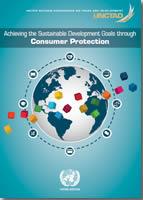
On 25 September 2015, the United Nations General Assembly adopted its resolution on transforming our world. This culminated in the 2030 Agenda for Sustainable Development¹ and advances the 17 Sustainable Development Goals (SDGs) as the plan of action to end poverty, protect the planet’s biosphere, and ensure prosperity for all.
Three months later, on 22 December, the General Assembly also adopted its resolution on Consumer Protection,² having revised the United Nations Guidelines for Consumer Protection (often abbreviated to “UNGCP” or “Guidelines”).
They then entrusted the United Nations Conference on Trade and Development (UNCTAD) with the mandate to promote the guidelines by encouraging member States to provide consumer protection in the provision of public and private goods and services.
By creating awareness in this field it is hoped that greater levels of cooperation between businesses and civil society will be generated. Consumer protection is at the heart of UNCTAD’s contribution to the sustainable and inclusive development rights for all.
The 17 Sustainable Development Goals require the participation of responsible and empowered consumers if they are to achieve their targets.
The only way to unleash the potential transformative power that consumers have in domestic and international trade is by ensuring a high level of consumer protection as well as to foster good business practices which seek the same goal.
The publication Achieving the Sustainable Development Goals through Consumer Protection aims to provide policymakers and enforcers with a basis for reflection on the positive impacts that protecting consumers bears in promoting a more inclusive and sustainable development.
This approach will help them improve the consumer protection framework while also devising and implementing development strategies. Equally, it underscores the close link between Agenda 2030 and the United Nations Guidelines for Consumer Protection.
This publication begins with a general overview of the contributions made by consumer policies in meeting the Sustainable Development Goals.
It then focuses on two issues that are of special relevance to this matter: sustainable consumption related to Goal 12 on Responsible Consumption and Production; and consumer protection in health-care delivery, according to Goal 3 on Good Health and Well-being.


